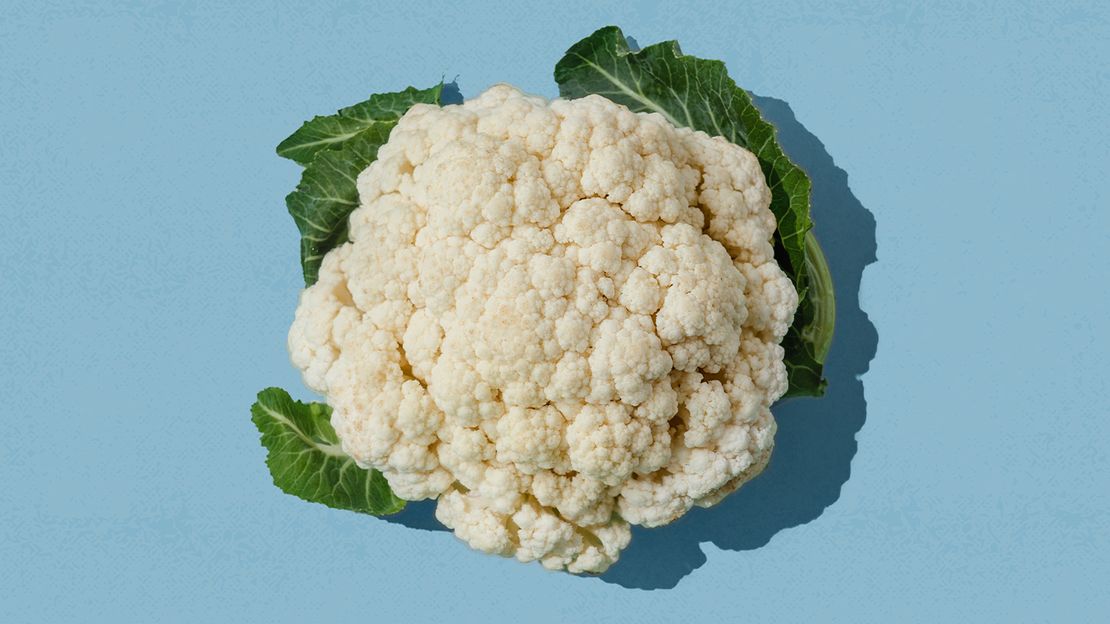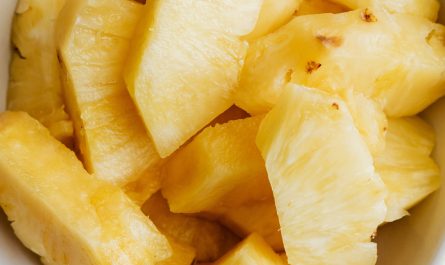It’s hailed as a low-carb substitute for rice or a meatless stand-in for chicken wings, but cauliflower has even more to offer, especially nutritionally.
fCauliflower has made a huge comeback in recent years. While you can roast or steam it for a quick and tasty way to get your veggies in, you can also get pretty creative with it. From cauliflower wings to cauliflower rice, this cruciferous veggie can replace just about everything — even so far as cauliflower steaks and pizza crusts. It’s low in calories, carbs, and fat, so it’s easy to see why it’s popular among keto dieters and people with diabetes looking for low-carb food options.
The recognizable white cauliflower isn’t the only option, though. There are purple, orange, and green varieties, thanks to different pigments (which are usually also antioxidants, so vary the colors for more nutrients). Regardless of the shade, all cauliflower tends to have a similar flavor — mild and nutty with slight sweetness. You can eat it raw or cooked, which has a slight effect on the taste. Raw cauliflower is a little more bitter than its cooked counterpart.
Like most produce, cauliflower is best enjoyed when it’s in season, which is during the fall months, according to U.S. Department of Agriculture (USDA). But don’t let that stop you from picking up some cauliflower the remainder of the year — it’s easily found in the freezer section of most grocery stores year-round.
The taste and versatility aren’t the only reasons to add cauliflower to your regular meal plan. Cauliflower is also packed with numerous potential health benefits. Here are seven more to consider.
1. Cauliflower Is Rich in Free-Radical-Fighting Antioxidants
“Being part of the brassica (cruciferous veggie) family, cauliflower is rich in special types of antioxidants called phytochemicals, which are known to help fight off free radicals from causing damage and aging to our cells,” says Jenna Volpe, RDN, who is based in Austin, Texas. She adds that cauliflower also contains antioxidants such as anthoxanthins, flavonoids, chlorophyll, quercetin, and coumaric acid.
Free radicals are unstable atoms that wreak havoc on cells, but antioxidants are sometimes referred to as “free radical scavengers” because they stabilize and neutralize them. Free radicals happen naturally in the body, but other sources are all around us — sun exposure being a big one. An antioxidant-rich diet can help mitigate the harmful effects of free radicals and have positive effects on diseases like cardiovascular disease, osteoporosis, cancer, and others, according to a review published in 2021 in the International Journal of Molecular Sciences.
2. Cauliflower Fights Inflammation, Potentially Reducing the Risk of Disease
There’s a silent killer on the loose, and it’s known as inflammation. According to research published in 2020 in Nature Medicine, chronic inflammation contributes to some of the leading diseases and causes of mortality worldwide, such as heart disease, cancer, diabetes, and kidney disease. Many factors contribute to inflammation, and your food choices are among them. Some foods drive inflammation, while others reduce it. Cauliflower is among the latter.
“Cauliflower and other cruciferous vegetables have properties that fight inflammation, according to a study published in the Journal of the Academy of Nutrition and Dietetics,” says Christine Byrne, RD, who is based in Raleigh, North Carolina. “Inflammation is complex, and some inflammation is good and necessary, but chronic inflammation can increase your risk of premature disease.”
3. Cauliflower Can Support a Healthy Immune System With High Levels of Vitamin C
Oranges, bell peppers, strawberries — these fruits and vegetables are high in vitamin C and touted as being beneficial for your immune system. Getting enough vitamin C through food positively affects immune health and reduces susceptibility to infection, according to a review published in 2020 in Frontiers in Immunology.
Now you can add cauliflower to the roster. A serving of cauliflower makes a significant dent in your daily vitamin C requirements.
Per the USDA, 1 cup of raw chopped cauliflower contains 51.6 milligrams of vitamin C, making it an excellent source.
4. Thanks to Its Vitamin K, Cauliflower Encourages Bone Health and Proper Blood Clotting
Vitamin K is an essential nutrient, and cauliflower is a good source of it, with 16.6 micrograms packed into 1 cup of the raw chopped veggie. It has antioxidant properties like other vitamins, but where cauliflower really shines is blood and bone health.
“Cauliflower is the only white veggie rich in fat-soluble vitamin K,” Volpe says. “The nutrient’s main role in the body is in blood clotting and coagulation, which explains why its name originates from the Germanic word koagulation, aka the ability to clot blood, coagulate, and prevent bleeding.” Without blood clotting, wounds would continue to bleed and wouldn’t be able to heal as a result.
But the vitamin K in cauliflower isn’t only beneficial for proper blood clotting — it also plays a primary role in bone health. Calcium is additionally critical for healthy bones, and together, the duo may be able to positively affect the prognosis of osteoporosis and low bone mineral density, according to a meta-analysis published in 2021 in the Journal of Orthopaedic Surgery and Research.
Volpe notes that individuals taking blood-thinning medications need to monitor their intake of vitamin K to avoid interactions.
5. Cauliflower Is Rich in Fiber, Which Supports a Healthy Gut and Heart
Fiber is one of the most important nutrients but one that many Americans struggle to get enough of. According to a review published in 2020 in Nutrients, the typical Western diet lacks fiber, despite its possible health benefits for gut motility, gut microbiota, and colon cancer.
While many Americans fill their plates with animal proteins like meat, eggs, and fish, these foods don’t contain fiber. So it’s up to your side dishes to get in fiber-rich foods like fruits, vegetables, grains, and plant-based proteins such as legumes, nuts, and seeds. Like many veggies, cauliflower is a good way to increase your fiber intake. A cup of cooked cauliflower has almost 3 grams of fiber, according to USDA data. This goes a long way toward the USDA’s 2020–2025 Dietary Guidelines for Americans (PDF) recommended 28 to 34 grams of fiber a day, depending on age and sex.
Fiber is most often associated with supporting gut health, but it’s also a heart-healthy nutrient. Fiber is known to reduce the risk of heart disease, but it may also benefit people with heart disease and high blood pressure, according to a meta-analysis published in 2022 in BMC Medicine.
6. Cauliflower May Reduce Cancer Risk
Cancer is a leading cause of death globally, according to the World Health Organization. It’s so prevalent that many people know at least one person affected by cancer. While there’s still much left to learn about cancer, some evidence points to cauliflower as having potential anti-cancer properties.
“Generally speaking, eating more fruits and vegetables is associated with a lower risk of cancer,” Byrne says. “But cruciferous vegetables like cauliflower may be particularly effective in preventing cancer cell growth because of certain phytochemicals they contain.” Byrne emphasizes that this doesn’t mean that eating cauliflower prevents cancer. “No disease can be caused or prevented by a single food or food group, nor is diet the only factor in health,” she adds. Rather, consider cauliflower as one possible weapon in your holistic artillery against cancer.
Research makes a case for doing just that. Cruciferous vegetables like cauliflower have been inversely associated with several types of cancer. According to a study published in 2017 in The Journal of Nutrition, eating cruciferous veggies may reduce the risk of lung cancer in nonsmokers. Similar studies have been conducted on breast, prostate, and colorectal cancer. Cancer researchers are particularly interested in cruciferous veggies due to the presence of glucosinolates, which are broken down into compounds like indoles and isothiocyanates that have been shown to inhibit cancer development in animal studies, according to the National Cancer Institute.
The antioxidants in cauliflower may also lend to its possible anti-cancer effects. “In addition to slowing down cell damage from oxidation, flavonoids (such as the ones found in cauliflower) have a strong tendency to help fight off cancer cells while maintaining healthy human cells,” Volpe says.
7. Cauliflower May Help Maintain a Healthy Weight
Maintaining a healthy weight is associated with good health, and fruits and vegetables can help in this respect. According to the Centers for Disease Control and Prevention, substituting low-calorie fruits and vegetables in the place of high-calorie foods can aid weight loss.
The water and fiber in fruits and veggies add volume, so you can eat the same portion with fewer calories. The fiber also helps you stay fuller for longer, and high fiber intake is associated with significantly lower body weight, according to a study published in 2019 in The Lancet.
With less than 30 calories per cup, cauliflower is a low-calorie food that comes in handy in meal plans for weight loss or maintenance. Keto dieters creatively use the veggie to make low-carb fried rice, pizza crust, mashed potatoes, and macaroni and cheese.




